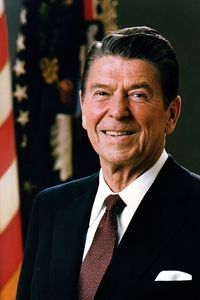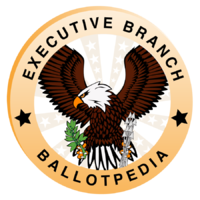Ronald Reagan
Ronald Wilson Reagan (b. on February 6, 1911, in Tampico, Illinois) was the 40th President of the United States. He served from 1981 to 1989 and died on June 5, 2004, at the age of 93.[1]
Prior to serving as president, Reagan served as the governor of California. Before becoming a politician, he was an actor and served as the president of the Screen Actors Guild.[2]
Biography
Reagan was born in Tampico, Illinois, and attended high school in Dixon, Illinois, where he acted in school plays and served as president of the student body. He played sports and continued acting while attending Eureka College. He earned degrees in economics and sociology before graduating and becoming a sports announcer for a radio station in Iowa. In 1937, Reagan began his acting career after signing a contract with Warner Bros. studios. He acted in a number of films throughout his 10-year contract and married his first wife, Jane Wyman. The couple divorced in 1948. Reagan served in the U.S. Army for three years, starting in 1942, but due to his poor eyesight, he used his time in service to act in training videos.[2]
He was president of the Screen Actors Guild in 1947, where he met his second wife, Nancy Davis, who was being targeted as a communist sympathiser by Hollywood. He hosted the weekly television series The General Electric Theater, for which he traveled the United States and led discussions about business and regulations. He used the hosting job to launch his political career, speaking for Barry Goldwater's presidential campaign at an event in 1964. He then won the 1966 election to become the governor of California and was re-elected in 1970. He campaigned for the presidency in 1968 and 1976, but Reagan didn't receive the Republican Party nomination until 1980.[2]
Reagan defeated George H.W. Bush and several others for the Republican nomination. He then chose Bush as his running mate. He and Bush defeated Democratic incumbent Jimmy Carter in the Electoral College by capturing 489 votes to Carter's 49. The victory was in part due to 52 Americans being held hostage in Iran for over a year without resolution from the Carter administration.[2]
Shortly after his inauguration, an attempt was made on the president's life. On March 30, 1981, Reagan was shot in the chest by John Hinckley Jr. while in Washington, D.C. The bullet passed through his lung and was only an inch from his heart. He was operated on at George Washington University Hospital and was only hospitalized for two weeks. His Press Secretary James Brady, however, suffered permanent brain injuries from one of the bullets.[3]
Reagan's domestic policy plans, known as Reaganomics or trickle-down economics, involved cutting taxes, deregulating businesses, increasing military spending, and implementing cutbacks on social programs. His foreign policy, known as the Reagan doctrine, aimed to fight communism by giving foreign aid to anti-communist regimes around the world. He also appointed Sandra Day O'Connor as the first female justice to serve on the United States Supreme Court.[2]
He and Bush were re-elected in 1984 by the largest margin in history, taking 525 of 538 electoral votes.[2] His second term focused less on battling the Cold War and was impacted by the Iran-Contra scandal, in which American guns were traded to the Iranians involved in the Iran-Iraq War for money that was funneled to anti-communist rebels in Nicaragua.[3] In 1987, the Reagan administration also passed the first trillion dollar budget request through Congress.[1]
Reagan left the White House in 1989, when his vice president, George H.W. Bush, was elected to the presidency. In 1994, Reagan announced that he was diagnosed with Alzheimer's disease, which he struggled with until his death in 2004.[2]
Career
Below is an abbreviated outline of Reagan's academic, professional, and political career:[2][1][4]
- 1932: Graduated from Eureka College
- 1932-1937: Radio sports announcer in Iowa
- 1937-1965: Actor in various productions
- 1940: Married Jane Wyman
- 1942-1945: Captain in the United States Army
- 1952: Married Nancy Davis
- 1967-1975: Governor of California
- 1968: Unsuccessfully campaigned for the Republican nomination for the U.S. presidency
- 1976: Unsuccessfully campaigned for the Republican nomination for the U.S. presidency
- 1981-1989: President of the United States of America
- 1990: Released autobiography An American Life
- 1993: Awarded the Presidential Medal of Freedom
- 1994: Announced his diagnosis with Alzheimer's disease
- 2002: Awarded, along with wife Nancy, the Congressional Gold Medal
- 2004: Died at age 93
State of the Union addresses
Every year in office, the president of the United States addresses Congress on the present state of affairs as well as the administration's goals for the coming year.[5] Addresses made by presidents in their inauguration years are not technically "State of the Union" addresses and are typically held in February.[6] Following are pages with information on Reagan's State of the Union addresses.
Elections
1984 presidential election
In 1984, Reagan defeated Walter Mondale (D) in the general election for the United States presidency.
| U.S. presidential election, 1984 | |||||
|---|---|---|---|---|---|
| Party | Candidate | Vote % | Votes | Electoral votes | |
| Republican | 59% | 54,455,472 | 525 | ||
| Democratic | Walter Mondale/Geraldine Ferraro | 40.7% | 37,577,352 | 13 | |
| Libertarian | David Bergland/James Lewis | 0.2% | 228,111 | 0 | |
| Total Votes | 92,260,935 | 538 | |||
| Election results via: 1992 official election results | |||||
Other candidates that appeared on the ballot received less than 0.1% of the vote. Those candidates included: Lyndon LaRouche Jr., Sonia Johnson, Bob Richards, Dennis Serrette, Gus Hall, Melvin Mason, Larry Holmes, Delmar Dennis, Edward Winn, Earl Dodge, John Anderson, Gerald Baker and Arthur Lowery.[7]
1980 presidential election
In 1980, Reagan defeated Jimmy Carter (D) in the general election for the United States presidency.
| U.S. presidential election, 1980 | |||||
|---|---|---|---|---|---|
| Party | Candidate | Vote % | Votes | Electoral votes | |
| Republican | 50.9% | 43,903,230 | 489 | ||
| Democratic | Jimmy Carter/Walter Mondale | 41.1% | 35,480,115 | 49 | |
| Independent | John Anderson/Patrick Lucey | 6.6% | 5,719,850 | 0 | |
| Libertarian | Edward Clark/David Koch | 1.1% | 921,128 | 0 | |
| Citizens | Barry Commoner/LaDonna Harris | 0.3% | 233,052 | 0 | |
| Total Votes | 86,257,375 | 538 | |||
| Election results via: 1980 official election results | |||||
Other candidates that appeared on the ballot received less than 0.1% of the vote. Those candidates included: Gus Hall, John Rarick, Clifton DeBerry, Ellen McCormack, Maureen Smith, Deirdre Griswold, Benjamin Bubar, David McReynolds, Percy Greaves Jr., Andrew Pulley, Richard Congress, Kurt Lynen, Bill Gahres, Frank Shelton, Martin Wendelken and Harley McLain.[8]
1970 gubernatorial election
In 1970, Reagan defeated Jesse Unruh (D) in the general election for governor of California. He also defeated Ricardo Romo (Peace and Freedom party) and William K. Shearer (American Independent party).[9]
1966 gubernatorial election
In 1966, Reagan defeated incumbent gubernatorial candidate Edmund G. "Pat" Brown (D) in the general election for governor of California.[10]
Personal
Note: Please contact us if the personal information below requires an update.
Reagan divorced his first wife, Jane Wyman, with whom he had one biological child and one adopted child. He married Nancy Davis in 1954, with whom he had two children. Reagan died in 2004, having been married to Nancy for more than 50 years. He was known to love eating jelly beans.[1][2]
Recent news
This section links to a Google news search for the term Ronald + Reagan.
See also
External links
- Ronald Reagan Presidential Library and Museum website
- Ronald Reagan Presidential Foundation & Institute
- Official White House biography
Footnotes
- ↑ 1.0 1.1 1.2 1.3 CNN, "Ronald Reagan Fast Facts," September 10, 2013
- ↑ 2.0 2.1 2.2 2.3 2.4 2.5 2.6 2.7 2.8 Biography.com, "Ronald Reagan biography," accessed July 4, 2014
- ↑ 3.0 3.1 University of Virginia's Miller Center, "American President: A Reference Resource," accessed July 4, 2014
- ↑ IMDb, "Ronald Reagan," accessed July 4, 2014
- ↑ Congressional Research Service, "The President’s State of the Union Address: Tradition, Function, and Policy Implications," January 24, 2014
- ↑ The American Presidency Project, "State of the Union Addresses and Messages," accessed October 14, 2014
- ↑ U.S. Election Atlas, "1984 Presidential Election Results," accessed May 6, 2014
- ↑ U.S. Election Atlas, "1980 Presidential Election Results," accessed May 6, 2014
- ↑ U.S. Election Atlas, "1970 Gubernatorial General Election Results - California," accessed February 25, 2019
- ↑ U.S. Election Atlas, "1966 Gubernatorial General Election Results - California," accessed February 25, 2019



